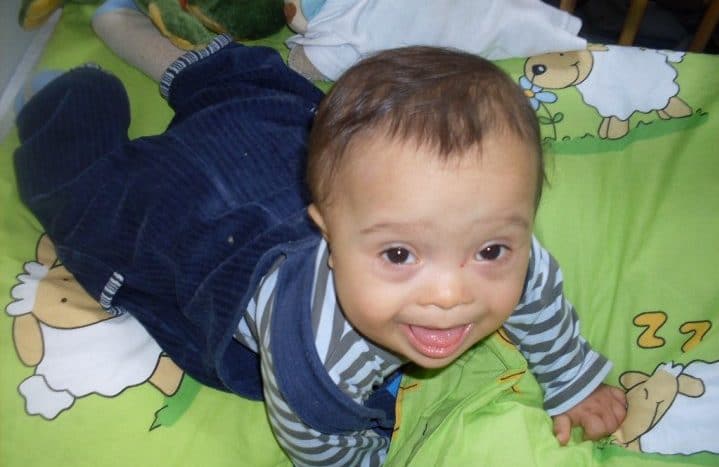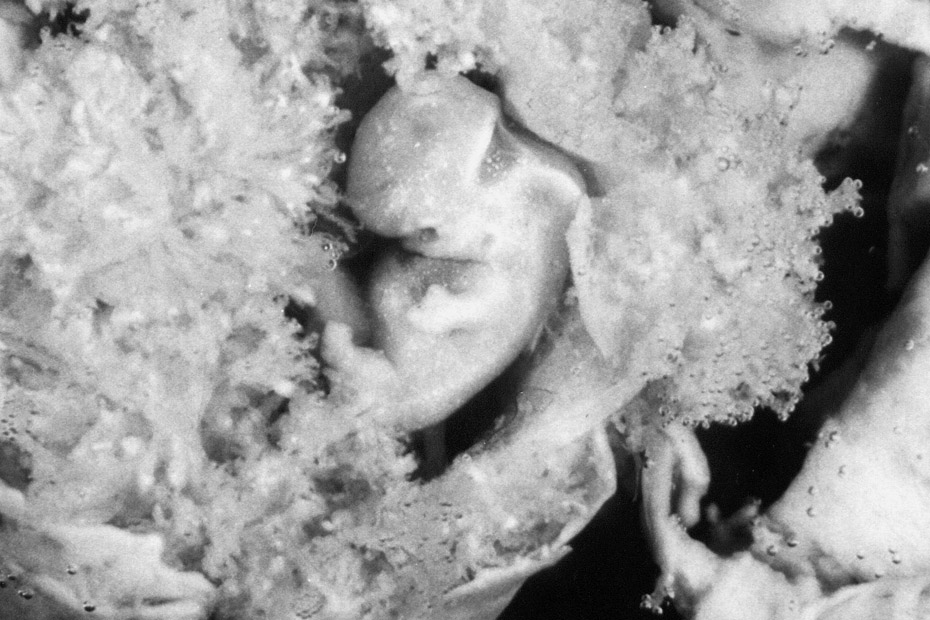By Father Shenan J. Boquet
Many people think that the eugenics movement perished with the death of Adolf Hitler and the end of his Third Reich. They couldn’t be more wrong.
In his campaign for racial purity, Hitler rounded up and executed millions of Jews, as well as people with physical or mental disabilities, gypsies, and other unwanted individuals deemed “lesser,” in the name of “purifying” the race.

While Hitler’s eugenicist practices were the most brutal in the world, many other “advanced” nations also experimented with eugenics. In the United States, tens of thousands of people deemed “unfit” were forcibly sterilized.
But while the eugenics movement did fall into disrepute after the enormity of the Nazi practices were revealed after the liberation of Europe by the Allies, the movement did not die. Instead, it simply went underground.
The Rise of Eugenics Towards Those With Down Syndrome
Within several decades, eugenics was back into full swing. This time, however, it was successfully hidden under the sterile appearances of legitimate “health care” and the soothing language of “choice” and “human rights.”
In every single developed nation today, preborn children, who fail to meet the arbitrary standards of their parents, are frequently exterminated in the womb. Among those who are systematically targeted are children who are diagnosed with Trisomy 21, more commonly known as Down syndrome.
The sheer magnitude of the practice of weeding out the disabled was revealed by recently released statistics from Scotland. The statistics show that in Scotland, the number of abortions of preborn children suspected to have Down syndrome has risen 81% since 2021.

Notoriously, the situation is even worse in Iceland. As ABC News reported recently, “In Iceland, upwards of 85 percent of women elect to have prenatal testing, and close to 100 percent of pregnancies where Down syndrome is diagnosed are terminated.” As a result, there are practically no people with DS living in Iceland.
A few months ago CNE News published a report with the alarming headline, “Down syndrome might disappear from the streets in the West.” As the news agency noted, the dire statistics in Iceland are also repeated in many other nations, including Denmark, with the result that it is becoming less and less common for people ever to meet anyone with Down syndrome.
The Pressured Betrayal By Healthcare
Many parents who find out that their preborn child may be born with Down syndrome report that they are not simply offered the option to abort the child but are actively pressured to do so. There is no shortage of chilling anecdotes to choose from. One recent story, out of the UK, is representative of the trend.
Leanne Constable recounted to Wales Online recently how she was told at 16 weeks pregnant that there was a 95% chance that her preborn child would have Down syndrome. She recalls the pressure campaign that immediately began.
“I didn’t really know anything about Down’s,” she told the paper. “I had seen people with it but had no personal connection and had an outdated version of what it means. I was worried that people with Down’s were institutionalised. My biggest concern was that he would not have a good life and that he would be bullied. Termination never entered my head but on the same phone call they suggested termination. I felt awful.”
She lamented that the information she received from her healthcare providers overwhelmingly emphasized abortion, rather than care for a child with Down syndrome. This “feels wrong,” she said. “I felt all the way through my pregnancy that the obstetricians always asked why I didn’t have an amnio. I had to have it put in my notes: ‘Do not discuss termination.’”
While her son, Parker, was indeed born with Down syndrome, she says the experience of having a child with the condition has not been the nightmare that people indicated it would be. On the contrary, it has been a beautiful and rewarding journey. Constable even set up an Instagram page simply to show others the beauty of her life with Parker.
“I decided that because I had had such a negative experience with doctors, I wanted to show parents a real life of a person with Down’s and the joy and love. I am not saying there are not hard days, but you can have that with any child. Having one less chromosome does not mean he is worth less,” she said.
Another famous case is that of Máire Lea-Wilson, who several years ago challenged the UK law allowing abortion up to the point of birth in cases of preborn children suspected to have Down syndrome. She recounted the terrible experience of finding out that her son, Aiden, likely had DS when she was 34 weeks pregnant.
She was “asked repeatedly if I wanted to terminate the pregnancy,” she told the Catholic News Agency. “Suddenly the way I was treated changed from an excited parent expecting a second child, to a woman facing a great tragedy who had to make a ‘choice’ – to abort my pregnancy or not.”
Irony of Anti-Down Syndrome Sentiment
The irony of “healthy” people deciding that people with Down syndrome should not be permitted to be born is that studies have found that people with Down syndrome report higher levels of happiness and life satisfaction than those without the condition.
At which point, we may well ask: Why are we aborting children with Down syndrome en masse? Is it because we are worried about their suffering, or because we are worried that they may make demands upon us that we are not prepared to meet?
I do not mean to downplay the challenges of raising a child with Down syndrome. It is certainly the case that this can be very difficult at times, as children with DS tend to suffer from a host of other comorbidities and require a significantly higher level of care.
And yet, it is also the case that in other, similar circumstances, civilized societies do not simply exterminate those suffering from various illnesses or disorders. Granted, this is beginning to change because of the successes of the euthanasia and assisted suicide advocates. In some nations, even people suffering from mental illness can now be cleared for assisted suicide or to be killed by a medical professional.
But this is not a change of which we can be proud. It only proves that the Nazi experiments did not kill the eugenics movement. But even still, in most cases there remains a strong social taboo against simply eliminating people who have inconvenient conditions.
At the philosophical level, we have the long-standing recognition that human beings are unique among all living beings: that they possess an intrinsic dignity. Human beings, as rational, are made “in the image and likeness of God,” and as such can never be treated as a means to an end. This is the foundation on which the radical idea of human rights has been built; and it is a foundation that must be jealously guarded.
On the practical level, we tend to recognize that once we begin designating some human beings as “worthy of life,” and others as “unfit,” we step onto a very slick slippery slope. Within short order, people who might previously have been deemed worthy of life, are suddenly cast out as unfit. After all, almost all of us will be ill or disabled at some point in our lives, whether through disease or age. Do we really want others, under the influence of sometimes-perverse incentives (such as saving health care costs), deciding when our lives are or aren’t worth living?
In Defense of Preborn Children with Down Syndrome
A few months ago, a representative of the Vatican, Archbishop Gabriele Caccia, made some moving and incisive remarks on the threat to preborn children with Down syndrome. Archbishop Caccia, who serves as the Apostolic Nuncio and Permanent Observer of the Holy See to the United Nations, was speaking at an event celebrating World Down Syndrome Day.
“Far too often,” he said, “society focuses on what people with Down syndrome cannot do, rather than what they can. When we focus only on limitations it becomes easy to decide that the costs outweigh the benefits of providing support and services.”
“That is,” he added, “while it may not be said openly anymore, there can be an attitude which asks, ‘What is the point in investing in someone who will never contribute?’ Or that suggest that it is a waste of resources.”
He continued:
This negative impression can lead not only to a lack of resources and support for children and adults with Down syndrome, but also to a mindset that think it would be best to eliminate Down syndrome. But this elimination means the elimination of the people. Indeed, it’s already going on! In certain countries nearly 100% of parents of babies who receive a prenatal diagnosis of Down syndrome are choosing to end the life of their son or daughter.
The archbishop noted that this practice goes directly contrary to UN declarations defending the rights and dignity of people with disabilities. The archbishop urged making available additional resources and training for those with Down syndrome, and their caregivers.
The archbishop noted the arbitrary nature of defining those with DS as inconvenient. After all, he pointed out, every single human being has limitations and is at times in need of additional support or care. “When we understand that all of us our dependent to a greater or lesser degree at different points in our lives,” he said, “it becomes easier to recognize our common humanity and the importance of ensuring that everyone has the support he or she needs to try. When everyone receives that support society more broadly flourishes.”
Love and Truth in the Road Ahead
I am grateful for these strong remarks by the archbishop. As anyone who has ever dealt with or encountered people with Down syndrome knows, they are often some of the most compassionate people. While their lives can come with challenges, their smiles have the power to light up rooms. They love, laugh, learn, feel hope, make friends, and create great joy in others. They witness to the truth that every child with special needs has a value that matters.
Even at a purely practical level, the elimination of children with Down syndrome is a loss for society. These children with disabilities are not a burden. They’re a priceless gift to us. We all benefit from their presence among us, as they challenge us to open our hearts, and to set aside our superficial and misguided standards of human worth.

Many successful programs have been created to find people with Down syndrome meaningful education and employment. In many cases, employees with DS are not only the most beloved employees in the company but are also often the most hard-working and reliable. Creating these programs creates a certain level of effort, but the effort does not only benefit those with Down syndrome, but also the many people whose hearts are softened, and who receive the love and affection of their coworkers.
This is what compassionate, forward-thinking, and resource-right societies can and should do. In so many other cases, we recognize that we all benefit when our society finds ways to welcome and support those suffering from disabilities. Why should it be any different with Down syndrome?
It is time to end these legalized eugenics, which is wiping out an entire class of people simply because they are different from us. Hitler would be proud of our widespread, industrialized eugenics program. That fact alone should be enough to make us pause in horror, and immediately reverse course.
This article has been reprinted with permission and can be found at hli.org/2025/07/a-quiet-genocide-new-eugenics-and-down-syndrome.
